|
|
|
Sort Order |
|
|
|
Items / Page
|
|
|
|
|
|
|
| Srl | Item |
| 1 |
ID:
114866


|
|
|
|
|
| Publication |
2012.
|
| Summary/Abstract |
The prevailing explanation of the institutionalization of the principles of war is misleading. Although the introduction of the principles into Western doctrine coincided with total war and the need to train unprecedented numbers of soldiers and junior officers in tactics, the fact that the principles disappeared from doctrines immediately prior to and during the Second World War suggests that they were not institutionalized to meet an increased need to educate the military. Instead, we test two other explanations: one drawing on the principles' military effectiveness and one drawing upon the principles' explanatory power. We find that neither one of these hypotheses stand. Instead, we conclude by elaborating on how the institutionalization of the principles of war can be made understandable using non-rationalist frameworks, in particular the growth of a particular kind of identity of staff officers in the late nineteenth and early twentieth century. According to this framework, the two world wars interrupted-rather than promoted-the institutionalization of the principles, since the wars with their large death tolls and mass recruitment increased the difficulties of creating a separate and unique identity for the burgeoning corps of staff officers.
|
|
|
|
|
|
|
|
|
|
|
|
|
|
|
|
| 2 |
ID:
181935
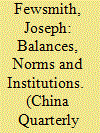

|
|
|
|
|
| Summary/Abstract |
In recent years, explanations of the Chinese Communist Party's longevity as a ruling party have focused on institutionalization. But a close look at the four leaders of China since 1978 reveal that institutions have remained weak. Of much greater importance have been balances that reflect the informal distribution of power and norms that express agreed-upon Party procedures. Of yet even greater importance have been the efforts of individual leaders to concentrate power in themselves through the appointment of protégés to critical positions. Such leaders also attempt to extend their influence beyond their terms in office through those protégés and their roles as “elders.” Thus, we see a tension between Party norms and the centralizing tendencies of Leninist systems in which the centralizing tendencies usually prevail. With Xi Jinping, we see a far greater personalization of power disrupting the norms and balances existing under previous leaders.
|
|
|
|
|
|
|
|
|
|
|
|
|
|
|
|
| 3 |
ID:
113812


|
|
|
|
|
| Publication |
2012.
|
| Summary/Abstract |
Over recent decades a judicialization process of international dispute settlement procedures has taken place. Yet, the judicialization of procedures remains meaningless if the procedures are not used and accepted by disputing states in practice. Prominent theoretical approaches point to different conditions under which this is to be expected. Realism emphasizes the international distribution of power, institutionalism stresses the importance of the institutional design of international dispute settlement procedures, and liberalism points to the domestic institutional setting of the participating states. The article confronts these theoretical expectations with states' actual dispute settlement behavior in the international trade regime, the United Nations Security Council, the European human rights regime and the regime on the protection of endangered species in the 1970s/80s and 1990s/2000s, respectively. Its main finding is that, compared to realism and liberalism, institutionalism fares better in explaining the judicialization of states' dispute settlement behavior.
|
|
|
|
|
|
|
|
|
|
|
|
|
|
|
|
| 4 |
ID:
095544
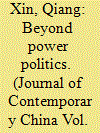

|
|
|
|
|
| Publication |
2010.
|
| Summary/Abstract |
Facing the ever-growing interdependence across the Taiwan Strait, Mainland China's strategy towards Taiwan is undergoing a profound change, that is, transcending the staunch realpolitik mentality and turning to an institutional arrangement in policy making. Especially since President Hu Jintao took up his position, the Mainland has endeavored to improve cross-Strait relations through the institutionalization of a series of sensitive issues, such as the proposals and signatures of some long-term accords aiming to advocate economic cooperation, promote social exchanges, weaken political opposition and foster mutual trust. By taking the Mainland's national development strategy shift, Taiwan's domestic reality and 'institution deficit' in cross-Strait relations into consideration, this paper analyzes the reasons, efforts and features of the Mainland's recent institutional-orientated policy transition.
|
|
|
|
|
|
|
|
|
|
|
|
|
|
|
|
| 5 |
ID:
115337
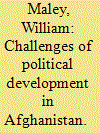

|
|
|
|
|
| Publication |
2011.
|
| Summary/Abstract |
The transition in Afghanistan is manifestly beset by multiple challenges, yet behind obvious issues such as insecurity and corruption lie a range of deeper problems related to the way in which the Afghan political system has developed. Trust deficits, real conflicts of interest, and parallel and potentially conflicting systems of authority, have affected both the mass population-many of whom feel disconnected and disenfranchised-and political elites, which remain severely divided. The combination of a presidential system with a highly centralized formal state structure had fostered patrimonialism at the expense of institutional development. Unless and until these problems are addressed, the likelihood that any Afghan government will be able to take the lead in confronting the country's problems remains low.
|
|
|
|
|
|
|
|
|
|
|
|
|
|
|
|
| 6 |
ID:
092988
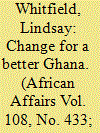

|
|
|
|
|
| Publication |
2009.
|
| Summary/Abstract |
This article analyses the process and outcomes of Ghana's 2008 elections, which saw the National Democratic Congress replace the New Patriotic Party and thus an alternation of ruling party for the second time since (re)democratization in the early 1990s. It argues that Ghana's democratic political system survived the closeness and intensity of the 2008 elections because it has developed stabilizing characteristics: an independent Electoral Commission and transparent electoral processes, integration of the political elite alongside the creation of norms and institutions structuring elite behaviour, and the institutionalization of political parties. The closely competitive elections are the result of a two-party system where voters and political elites are mobilized around two political traditions. These political traditions provide ideological images, founding mythologies and political styles for the parties. Thus, Ghana is different from several African countries where parties split or form around leaders, who bring their popular support base with them. It is also different in that elections are not dominated by ethnic politicization, because the two main parties in Ghana have a strong political support base in most regions and party identification is based on cross-cutting social cleavages of which ethnicity forms only one part.
|
|
|
|
|
|
|
|
|
|
|
|
|
|
|
|
| 7 |
ID:
178741
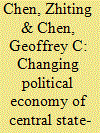

|
|
|
|
|
| Summary/Abstract |
This research seeks to reconceptualise the process of marketizing central state-owned enterprises (CSOEs) in the Chinese petroleum industry by interpreting their institutional establishment and reconstruction, and the change in their institutional context. The enterprise reform of state-owned oil companies, and the partial market liberalization initiated in the 1980s, have not pushed the petroleum sector toward the trajectory of the neoliberal free market. On the contrary, the state’s ascendency has been reconsolidated, and the institutional practice adhered to has made market-shaping possible. The state’s role is not fixed; rather, it has varied following the marketization process of the CSOEs. The state has reconstructed its role to strengthen its authority in the market, using market mechanisms to effectively improve its power to construct a flexible economic governance structure. In such a structure, where the state and market have mutually shaped each other, the combination of the two seemingly conflicting concepts of marketization and economic security has, to some degree, fostered the development of state-owned oil companies and expanded the scale of their asset-holding. The paper contributes to the broader discussion of state-market relationships and the institutionalization of energy governance with regard to China’s integration into the global capitalist economy.
|
|
|
|
|
|
|
|
|
|
|
|
|
|
|
|
| 8 |
ID:
156093
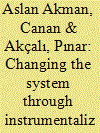

|
|
|
|
|
| Summary/Abstract |
Since the 1990s, debates on a constitutional system reform in Turkey have ignited controversies over the executive structure of its parliamentary system. This article looks at the debate in terms of the interaction between institutional dynamics and politicians’ choices, shaped by past institutional transformations following transitions. It is contended that institutional weaknesses underlying both the presidency and executive–legislative relations in Turkey have provided strong incentives for incumbent elites to challenge existing parliamentary norms and advocate presidential alternatives. Far from contributing to a sober diagnosis of the problems of parliamentarism, the recent constitutional amendment introducing a system of executive presidency has further divided Turkey’s already polarized political and civil society.
|
|
|
|
|
|
|
|
|
|
|
|
|
|
|
|
| 9 |
ID:
081863
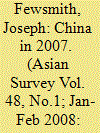

|
|
|
|
|
| Publication |
2008.
|
| Summary/Abstract |
In 2007 China was dominated by politics, specifically the preparations and negotiations heading into the Seventeenth Party Congress, which was held in late October. General Secretary Hu Jintao was successful in having his "scientific development concept" written into the Chinese Communist Party Constitution but was not allowed to name his own successor
|
|
|
|
|
|
|
|
|
|
|
|
|
|
|
|
| 10 |
ID:
098785
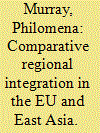

|
|
|
|
|
| Publication |
2010.
|
| Summary/Abstract |
In comparative regional integration (RI) analysis, the European Union's (EU) advancing of its own experience as a model is a significant problem. This article explores this problem by focusing on comparative aspects of RI in the EU and East Asia. It argues that there are important and valid aspects of comparison, such as the origins and objectives of these two regions, but fewer points of comparison between the two when it comes to achieving their objectives. It suggests that historical differences between the two regions constitute the major reason that a direct comparison is neither useful nor productive. It analyses the centrality and the exceptionalism of the EU in much of the comparative RI literature. It agues that the promotion of the EU experience as a form of model or paradigm is far from analytically helpful - the method of comparative analysis needs be the focus of our study as much as the objects of comparison. The article examines how the centrality of the EU in some analysis can amount to a form of de facto snobbery in the positioning of the EU on a rather unsteady pedestal. This 'integration snobbery' - to coin a phrase utilized by an EU official - is not constructive for comparative analysis of the EU and East Asia.
|
|
|
|
|
|
|
|
|
|
|
|
|
|
|
|
| 11 |
ID:
133314
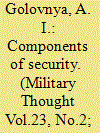

|
|
|
|
|
| Publication |
2014.
|
| Summary/Abstract |
The paper examines the issues of institutionalizing security in post soviet Russia. It offers analyses of the historical practice of establishing security related state institutions and their work.
|
|
|
|
|
|
|
|
|
|
|
|
|
|
|
|
| 12 |
ID:
113933
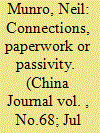

|
|
|
|
|
| Publication |
2012.
|
| Summary/Abstract |
The low degree of institutionalization of Chinese administration means that citizens engaging with the bureaucracy have a choice of strategies to achieve objectives. This article deploys Asia Barometer survey data from 2006 to construct a predictive model of preferences to obtain a government permit, including use of connections (guanxi), bribery, writing letters, waiting patiently, and the passive-pessimistic response "nothing can be done". It finds that strategy preference varies according to location (urban or rural interacting with region), socio-economic status, social capital, political values and political performance evaluations. The pattern of determinants shows that Chinese citizens are cross-pressured. The class and gender nature of guanxi and bribery are an obstacle to the creation of a modern Chinese state, but high levels of social trust, support for political freedom, the market and meritocracy combined with the reservoir of trust enjoyed by executive organs present a favourable climate for efforts to improve governance.
|
|
|
|
|
|
|
|
|
|
|
|
|
|
|
|
| 13 |
ID:
109585
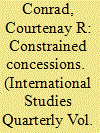

|
|
|
|
|
| Publication |
2011.
|
| Summary/Abstract |
Do domestic institutions affect how dictators respond to their political opposition? In this paper, I argue that institutionalization is key to understanding whether dictators respond to domestic opposition groups with concessions. I present a nominal typology of dictatorial opposition movements, arguing that the manner in which the opposition is incorporated into the regime reveals important information about the types of concessions dictators will likely provide. Using a system of endogenous equations, I show that dictators buy off some types of domestic opposition with material concessions and liberalize when they face other types of opposition. Because dictators often make decisions facing environmental constraints, however, I also argue that financial conditions can limit a dictator's ability to respond beneficently to the opposition.
|
|
|
|
|
|
|
|
|
|
|
|
|
|
|
|
| 14 |
ID:
153716
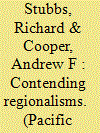

|
|
|
|
|
| Summary/Abstract |
As regions become more institutionalized, they are characterized by two competing trends. First, key regional institutions can become hub institutions that act as transmitters of a comprehensive set of norms. Second, as regional institutions increase in number, regions themselves are liable to become more fragmented. How these trends have played out is explored in two key regions, the Americas and the Asia-Pacific. It is concluded that regions are not static entities but are ever-changing structural arrangements. Hub institutions can be challenged and the consequences can be significant as regions gain in importance on the international stage.
|
|
|
|
|
|
|
|
|
|
|
|
|
|
|
|
| 15 |
ID:
140054


|
|
|
|
|
| Publication |
Virginia, Reston Publishing Company, Inc., 1976.
|
| Description |
xiii, 466p.pbk
|
| Standard Number |
0879091363
|
|
|
|
|
|
|
|
|
|
|
|
Copies: C:1/I:0,R:0,Q:0
Circulation
| Accession# | Call# | Current Location | Status | Policy | Location |
| 017466 | 658.4080973/ACK 017466 | Main | On Shelf | General | |
|
|
|
|
| 16 |
ID:
073841
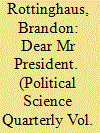

|
|
|
|
|
| Publication |
2006.
|
| Summary/Abstract |
BRANDON ROTTINGHAUS looks at an important but untold story of the origins, adaptations, and utility of public opinion mail sent to the White House as a political tool. He concludes that the apparatus for gauging public opinion by the mail predates but largely mirrors the institutionalization of opinion polling in the West Wing and serves as a valuable measure of opinion for presidents interested in understanding and managing public opinion.
|
|
|
|
|
|
|
|
|
|
|
|
|
|
|
|
| 17 |
ID:
100284
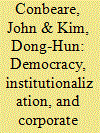

|
|
|
|
|
| Publication |
2010.
|
| Summary/Abstract |
The authors bring together and extend three strands of existing research: the propensity of democracies to ally with each other, the effects of alliances being institutionalized, and the causal impact of democracy in promoting investment. This literature is applied to corporate alliances, predicting the probability that announced alliance contracts will be completed by the participants. The authors find that democratic political regimes generate rules that create corporate shareholder democracy and that the latter promotes the institutionalization of corporate alliances. Corporate democracy and alliance institutionalization will both, controlling for transaction costs, increase the probability that corporate alliances will be completed. The findings suggest a positive association among democratic corporate governance, the willingness of corporate alliance partners to accept institutionalized ties, and the creation of an environment conducive to commercial investment commitments through alliances. Overall, corporations appear to respond to some of the same alliance incentives as sovereign states.
|
|
|
|
|
|
|
|
|
|
|
|
|
|
|
|
| 18 |
ID:
117912
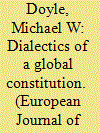

|
|
|
|
|
| Publication |
2012.
|
| Summary/Abstract |
As a decentralized legal order, the international system arguably has no single constitution, but the closest candidate to a constitution that it does have is the UN Charter. Thus it is worth exploring how constitutional the Charter is in theory and practice. Sixty-plus years into its evolution we can see two dominant features. First, its key constitutional elements are: supranationality in its various forms; inequality; and, like all constitutions, an 'invitation to struggle' that leads to inevitable pushback from states when UN authority expands. Second, unlike in many domestic constitutions, the pushback more than holds its own. The UN has neither integrated its parts nor centralized authority. To illustrate those points, I start with a comparison of the UN Charter to both capital 'C' domestic constitutions and to ordinary treaties. I then address with a broad brush the main features of the UN's supranationality and inequality. The Secretariat and its neutrality and independence are the next topics. I then consider two examples of tension between UN supranationality and sovereignty. I explore the trend toward 'global legislation' associated with the Security Council's counter-terrorist resolutions, 1373 and 1540. I then focus on the example of the Millennium Development Goals, the UN's recent attempt to remake itself as a development body. I conclude with a discussion of the wider constitutional significance and prospects of the UN in the light of the contrasting success of the history of US federalism and European integration.
|
|
|
|
|
|
|
|
|
|
|
|
|
|
|
|
| 19 |
ID:
163340
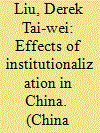

|
|
|
|
|
| Summary/Abstract |
This study takes advantage of a “natural experiment” to show how institutionalization shapes economic outcomes in China. Beijing introduced the mandatory retirement age for provincial leaders in the 1980s, but the rule was not enforced across all provinces until 2000. I use this window to construct a difference-in-differences design and show how the enforcement of mandatory retirement rule leads to better economic outcomes. Provincial leaders eligible for promotion are now motivated to perform better on growth in order to succeed under the performance-based promotion system. But this institution is not perfect, as it results in poorer performances among lame-duck leaders near the retirement age. I also find that leaders with central connection tend to have worse performances. This suggests that when politicians have connection with the center, they hold the key to promotion already, so they do not need to worry about the Chinese-style yardstick competition.
|
|
|
|
|
|
|
|
|
|
|
|
|
|
|
|
| 20 |
ID:
123530
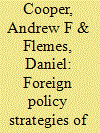

|
|
|
|
|
| Publication |
2013.
|
| Summary/Abstract |
This Introductory Review examines the major debates concerning the rise of emerging powers in the global system. It points to the fundamental difference between the contours of ascendancy in the first quarter of the twenty-first century from previous historical eras with reference to the number of countries placed in this category, the privileging of economic dimensions of power, and the much more elaborate and open levels with regard to institutionalization. Ample attention is paid to the BRICS, but consistent with the image of multipolarity, it also gives some emphasis to the question of whether the changing global system provides enhanced space for middle powers. After highlighting these highly relevant contextual considerations, the core of the Review moves to an analysis centred on more specific puzzles about the foreign policy strategies of emerging powers. One major puzzle is whether the preference of rising states is to work through established institutions or to utilize parallel and/or competitive mechanisms. Another concerns the balance between material interests, status-enhancement, and identity issues as motivators for policy preferences. Still another focuses on the degree to which China should be differentiated from the other BRICS, or indeed whether the BRICS share values such as a common politics of resentment or want to differentiate themselves on a normative-oriented basis in alterative groupings such as IBSA. A more sophisticated awareness of the limitations as well as of the capacities of the BRICS - with an appreciation of the intricate mix of concerns about solidarity and sovereignty, as well as conceptual tensions between realism and complex interdependence - is not only important for assessing the future trajectory of the BRICS role in the world, but in locating space for categories of countries such as middle powers. The major puzzle for middle powers is whether or not they will be able to mobilize attributes, notably the leveraging of 'network power', that provide them with comparative advantage. Although in overall terms the global system has not progressed towards multipolarity in a linear fashion underwritten by alternative actors, it is precisely due to this imprecision - and level of academic and operational contestation - that the articles assembled in this Special Issue have such salience.
|
|
|
|
|
|
|
|
|
|
|
|
|
|
|
|
|
|
|
|
|